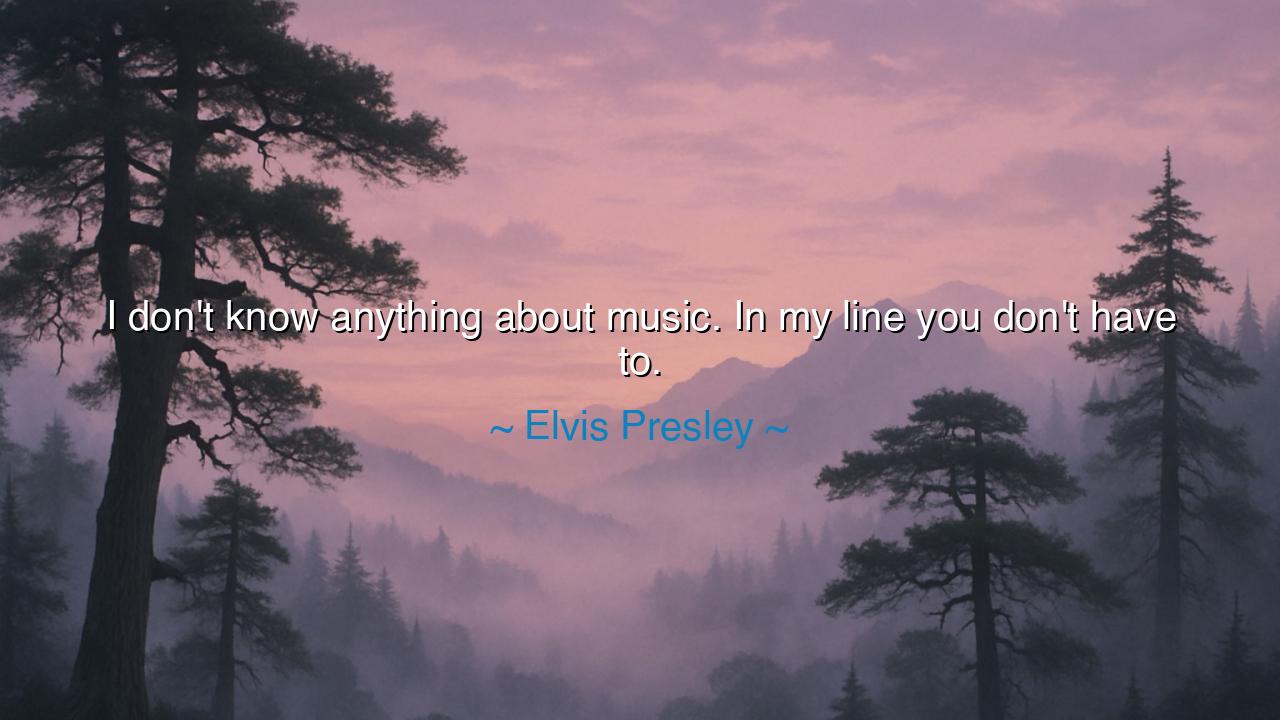
I don't know anything about music. In my line you don't have to.






Elvis Presley, the king of rock and roll, once uttered words both humble and profound: “I don’t know anything about music. In my line you don’t have to.” At first glance, these words may sound like the dismissal of knowledge, but in truth they reveal something far greater—the power of instinct, of heart, of raw human expression. Elvis reminds us that music is not only written on paper or studied in schools, but also born in the fire of the soul, in the cry of the human spirit.
To confess ignorance of music while being one of the greatest performers of all time is not a contradiction, but a revelation. Elvis was not trained in conservatories, nor did he master the intricate theories of harmony and counterpoint. His gift was not technical but visceral. He carried within him the gospel of the church, the cry of the blues, the rhythm of country, and the pulse of rock. He did not need to “know” music in the scholarly sense, because he felt it, lived it, became it. His words remind us that true artistry does not always come from the head—it often comes from the heart.
History confirms this truth. Robert Johnson, the legendary bluesman, knew little of formal music, yet from his guitar came sounds that shaped generations. His playing carried not the polished sheen of academic mastery, but the raw edge of experience and longing. The same is true of countless folk singers, drummers, and storytellers across the world, whose music endures without written notes or structured lessons. Elvis joins this lineage, declaring that sometimes greatness lies not in technical mastery but in the ability to awaken feeling in others.
And yet, his words carry another meaning. In saying “In my line you don’t have to,” Elvis reveals the truth of his era—the rise of a new kind of music where passion mattered more than polish. Rock and roll was not born in universities, but in the bars, the fields, and the street corners. It was rebellious, unrefined, and alive. Elvis embodied this spirit: he broke barriers, not because he studied them, but because he ignored them. His line of work was about breaking free, about shaking the world with energy, daring, and presence.
But let us not misunderstand. Elvis does not mock knowledge. Rather, he shows that knowledge alone is not enough. One may master every note and still fail to move the heart. Another may know little, yet stir nations to dance, weep, and believe. This is the paradox of art: it lives not in perfection but in truth. And truth is not always taught—it is lived, suffered, expressed. Elvis’s greatness was not that he knew music, but that he became its vessel.
The lesson, then, is powerful for all who seek to create: do not wait until you “know enough” to begin. Do not fear if you lack training, wealth, or pedigree. Begin with what you have—the voice in your throat, the rhythm in your body, the fire in your heart. Learn if you can, but never believe that knowledge alone will make you an artist. The greatest art comes when you dare to give yourself fully, even if the world says you are unprepared.
So, children of tomorrow, take this counsel to heart: follow your gift wherever it leads. If you are trained, let your knowledge serve your passion. If you are untrained, let your passion become your knowledge. For in the end, the measure of art is not theory but power—the power to move, to awaken, to stir the souls of others.
Thus remember always: in art, it is not necessary to know everything—it is necessary to feel everything. Elvis Presley, who claimed to know nothing of music, gave the world a new music, one that will never die. His words teach us that greatness comes not only from knowledge, but from courage—the courage to let your soul sing.






AAdministratorAdministrator
Welcome, honored guests. Please leave a comment, we will respond soon